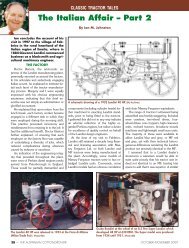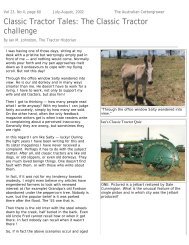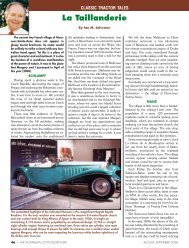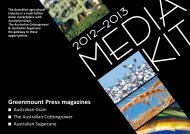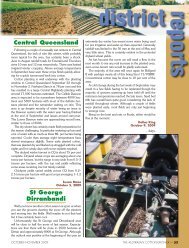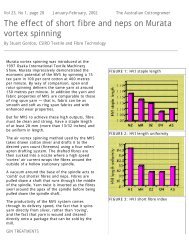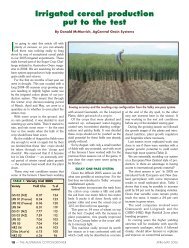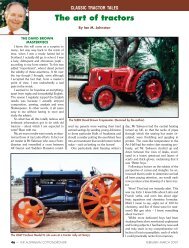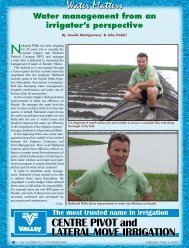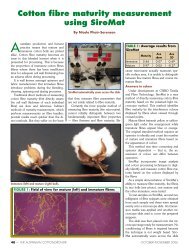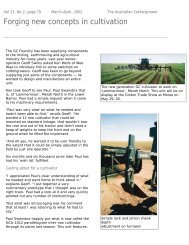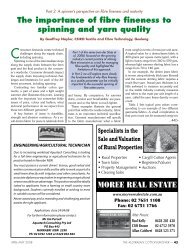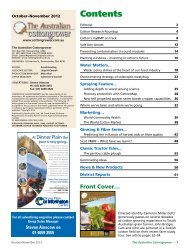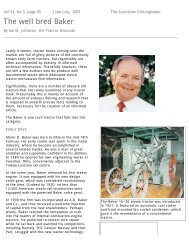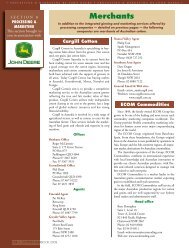growers@sgcotton.com.au Roger Tomkins - Greenmount Press
growers@sgcotton.com.au Roger Tomkins - Greenmount Press
growers@sgcotton.com.au Roger Tomkins - Greenmount Press
You also want an ePaper? Increase the reach of your titles
YUMPU automatically turns print PDFs into web optimized ePapers that Google loves.
<strong>com</strong>panies, the reality was that the energy sector was negatively<br />
impacting on the <strong>com</strong>munity.<br />
Fairfax Agricultural Media Canberra Bure<strong>au</strong> Chief Colin Bettles<br />
told the session that his visit to the Powder River Resource Basin<br />
in Wyoming earlier this year had highlighted an ambivalent<br />
attitude to the energy industry by landholders.<br />
He said many had made a lot of money, but there had also<br />
been a major environmental and production cost paid, primarily<br />
due to the inadequate management of the salty waste water.<br />
Colin said if there was a lesson to be learnt for Australia it was<br />
the need to manage the waste water, and not to just rush into<br />
development.<br />
Andrew agreed. “If the answer is anything like what has<br />
happened in the Powder River Basin, then you would be crazy to<br />
go there,” he said.<br />
Forward contract forum<br />
sparks debate<br />
The Australian Cotton Shippers Association (ACSA) proposal<br />
to adjust the base grade from the existing middling to the higher<br />
quality strict middling, attracted plenty of interest and discussion<br />
at the Australian Cotton Conference.<br />
Speaking at the Forum, Gordon Cherry (Louis Dreyfus<br />
Commodities and ACSA member) noted that 60 to 70 per cent<br />
of the Australian cotton crop was forward sold up to three years<br />
ahead of the crop planting and of those forward sales, 90 per<br />
cent were for the strict middling quality.<br />
“Currently the higher quality strict middling cotton is priced<br />
too closely to the current base grade middling cotton and so the<br />
strict middling quality cotton is subsidising the middling,” he said.<br />
“Or in other words, the linkage between the two means that<br />
the middling is limiting the potential for the strict middling quality<br />
to achieve a higher premium.”<br />
Gordon cited research which has found that Australian<br />
growers have consistently produced higher amounts of the<br />
strict middling quality cotton. More than double the amount of<br />
middling over the past 10 years.<br />
Growers at the forum expressed concerns regarding the ability<br />
of the Australian cotton industry to supply the higher grades of<br />
cotton on a consistent basis.<br />
Gus McClymont, Neek Morawitz and Tracey Leevan at the<br />
Cotton Conference.<br />
Andrew Parkes of Moree queried if, due to dry years and<br />
perfect growing conditions, the industry had created an<br />
unrealistic expectation by the export markets of the quantity of<br />
higher level cotton that could be produced.<br />
“Environment plays the largest part in the quality and colour<br />
of the cotton crop,” he stated.<br />
“Weather and especially rain can play havoc with an existing<br />
premium crop; factors which we the growers have no control<br />
over,” Andrew said.<br />
“Generally, growers can be assured of returning a middling<br />
quality crop so why is this current base grade not the focus of our<br />
marketing and selling efforts?”<br />
The desire of China, Australia’s key importer of cotton, to<br />
purchase only the higher grade of cotton from Australia was<br />
cited as the answer.<br />
Gordon said, quoting a Chinese buyer:<br />
“I buy from Australia for the higher quality strict middling<br />
quality cotton. If I wanted the lesser quality middling I would look<br />
to the less expensive markets of Brazil, the US and India.”<br />
Hendra Ho, a cotton buyer with Coorom based in Sydney,<br />
attended the forum and agreed that it was a difficult situation for<br />
the growers, marketers and buyers.<br />
“It is always a problem when the quality that has been<br />
purchased cannot be delivered,” he said.<br />
“Our milling clients in Asia specifically want the higher grades<br />
of cotton, and have limited use for the lower graded middling.”<br />
Sex sells<br />
Just like for the opening address, the <strong>au</strong>ditorium at the<br />
Conference was packed as delegates gathered to hear Dr Rosie<br />
King, sex therapist speaking on Managing Intimate Relationships.<br />
In line with the agricultural theme, Rosie focused her amusing<br />
presentation on pollinating, suggesting that “sex is good for<br />
you.” A statement that brought appl<strong>au</strong>se from the <strong>au</strong>dience!<br />
Rosie provided conference attendees with several pearls of<br />
wisdom for increased well-being, stress release and longevity.<br />
Her first key message was for everyone to get their Vitamin T,<br />
a minimum of a seven second hug every day for well-being.<br />
Her second message was to ensure everyone gets skin on skin<br />
time from your partner, a massage or even a pet.<br />
Ironing is foreplay was a message appl<strong>au</strong>ded by the women in<br />
the <strong>au</strong>dience and ‘The more you smoke, the less you poke’ was<br />
greeted by nervous l<strong>au</strong>ghter by some in the <strong>au</strong>dience.<br />
The second keynote speaker of the session was Todd<br />
Sampson, CEO of Leo Burnett and break-out star of ABC’s The<br />
Gruen Transfer.<br />
Todd had all enthralled with his message of creativity, courage<br />
and over<strong>com</strong>ing fear. All appreciated his message that the most<br />
spectacular leaders are not braver than the average person – they<br />
are just braver for five minutes more.<br />
Todd used his experiences as an instigator of ‘Earth Hour’,<br />
an initiative that <strong>com</strong>menced in Sydney and is now a global<br />
phenomenon in which 135 countries and one billion people<br />
participate.<br />
Todd recalled his meeting with Sir Edmund Hillary after<br />
simply looking up his phone number in the white pages, and his<br />
subsequent second meeting with the renowned mountaineer at<br />
the Mount Everest base camp.<br />
Sensing some anxiety in Todd as he prepared for his unassisted<br />
Everest climb, Sir Edmund inspired him with “Todd, don’t be<br />
afraid,” a message that Todd passed on to conference attendees.<br />
16 — The Australian Cottongrower August–September 2012



